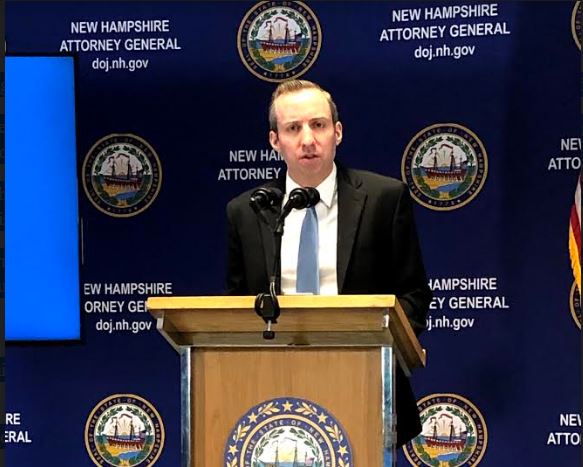Concord, NH – Attorney General John M. Formella announces that on this the 75th Anniversary of the desegregation of the U.S. Military, he is proud to co-lead a bi-partisan, multi-state call on Congress to pass H.R. 1255, the Sgt. Isaac Woodard, Jr. and Sgt. Joseph H. Maddox GI Bill Restoration Act of 2023. The proposed federal legislation, named in honor of two Black World War II veterans, would extend eligibility for housing loans and educational assistance administered by the Secretary of Veterans Affairs to Black World War II veterans, their surviving spouses, and certain direct descendants if the veteran was previously denied benefits on the basis of race.
Today’s letter was also co-led by Massachusetts Attorney General Andrea Joy Campbell and joined by a coalition of the attorneys general.
“For me this is all about fairness and righting past wrongs. We must keep up our end of the bargain and ensure that all of those who served and protected us are ultimately given the promised benefits they earned risking their lives for our nation,” said New Hampshire Attorney General John M. Formella. “I recognize that there is much more work to do to ensure that all veterans have access to the benefits they deserve, including healthcare, housing, education, and disability related benefits. Restoring these earned and unfairly denied benefits to Black veterans and their descendants will fuel our economy and, most importantly, send the message that none of our heroes will ever be forgotten.”
“I’m proud to co-lead this bipartisan coalition of attorneys general calling on Congress to extend assistance to Black veterans that were sadly denied benefits. The painful reality is that too many of our country’s institutions and policies were designed to exclude Black residents and people of color,” said Massachusetts Attorney General Andrea Joy Campbell. “While white veterans were provided benefits through the GI Bill that led to homeownership, educational and employment assistance, many Black veterans were flat-out denied access to those same opportunities that we know are the bedrock of wealth-building and economic mobility. Simply put, the system failed Black veterans and their families, and seventy-five years later, we have an opportunity to right the wrong.”
In a letter to Congress, Formella and a coalition of his fellow attorneys general asserted the legislation, through expanding access to homeownership and education, would help rectify past wrongs and fuel continued economic growth in communities across the country. “Our decision to uplift this legislation on this date is intentional,” the letter contends. “Today marks the 75th anniversary of President Truman’s signing of Executive Order 9981, on July 26, 1948, which mandated the desegregation of the U.S. military. This anniversary represents a powerful moment for us to honor and reaffirm our commitment to supporting and expanding economic opportunity for all of American’s veterans.”
Although the legislative text of the G.I. Bill was race neutral, the administration of benefits was discriminatory, and Black World War II veterans were often denied opportunities. Institutions adopted the Federal Housing Administration’s racial exclusion programs, known as redlining, which excluded Black veterans from accessing the housing loan guaranty program. Black veterans were also denied access to educational benefits at certain universities on the basis of their race and were instead directed to vocational schools and chronically under-resourced historically Black colleges and universities.
The Sgt. Isaac Woodard, Jr. and Sgt. Joseph H. Maddox GI Bill Restoration Act of 2023, extends access to VA home loans and the Post-911 GI Bill education assistance benefits to Black World War II veterans, and to their surviving spouses and certain direct descendants, who were denied benefits in the original bill.
The bill is named in honor of two Black World War II veterans. Sgt. Woodard was beaten and blinded in uniform by South Carolina police who dragged him from a bus in 1946. Sgt. Maddox was accepted by Harvard University but denied VA financial assistance because the agency wanted to “avoid setting a precedent.”
The Sgt. Isaac Woodard, Jr. and Sgt. Joseph H. Maddox GI Bill Restoration Act of 2023 would:
· Extend access to the VA Loan Guaranty Program to the surviving spouse and certain direct descendants of Black World War II veterans who are alive at the time of the bill’s enactment, if they can certify that the veteran was denied a specific benefit on the basis of race;?
· Extend access to the Post-911 GI Bill educational assistance benefits to the surviving spouse and certain direct descendants of Black World War II veterans alive at the time of the bill’s enactment, if they can certify that the veteran was denied a specific benefit on the basis of race;
· Require a Government Accountability Office (GAO) report outlining the number of individuals who received the educational and housing benefits as a result of this bill;?
· Establish a Blue-Ribbon Panel of independent experts to study inequities in the distribution of benefits and assistance administered to female and minority members of the Armed Forces and provide recommendations to Congress and the President on additional assistance to repair those inequities.?





